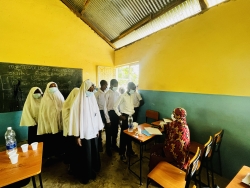
In Tanzania, anaemia rates among adolescent girls aged 15-19 increased from 42% to 47% between 2010 and 2015, highlighting a critical health concern. To address this issue, the ARISE project implemented and evaluated school-based micronutrient supplementation and educational interventions in 42 selected schools across the Zanzibar islands, focusing on vulnerable nutrition situations. The World Health Organization recommends weekly iron folic acid (IFA) supplementation in areas with high anaemia rates, prompting the project's implementation strategy.
A three-arm cluster-randomized, school-based supplementation trial was conducted among 42 schools in Tanzania and Burkina Faso. Roundly 4,500 students aged 10-17 were enrolled over a period of 2 years. Each school was randomized to receive either weekly IFA, daily MMS, or served as a control. Supplements were delivered to students by teachers, who provided monitoring data to the study team. Baseline and end-line surveys were conducted prior to and after each supplementation cycle to assess haemoglobin, anthropometry, and socio-demographic variables.
Engagement with key stakeholders (from the ministry of health and education, teachers, parents and students) crucial in designing the project, obtaining valuable feedback and addressing challenges. In the course of the project, a qualitative assessment was conducted to assess the experience and challenges among students and teachers in the supplementation exercise.
Collaboration with partners such as the Zanzibar Association of People Living with HIV (ZAPHA+) and the Harvard T.H. Chan School of Public Health strengthened project implementation and outreach. Preliminary analyses revealed a reduction of 2.4% in moderate/severe anaemia levels from baseline to endline, indicating positive impacts of the interventions.
Looking ahead, the project plans to disseminate findings in 2024 and explore opportunities for sustainability and scalability. Partnerships with local and international stakeholders demonstrate the project's potential for influencing broader health initiatives. Overall, the project's success not only addresses immediate health concerns but also fosters long-term strategies for improving adolescent nutrition and health in Zanzibar.
